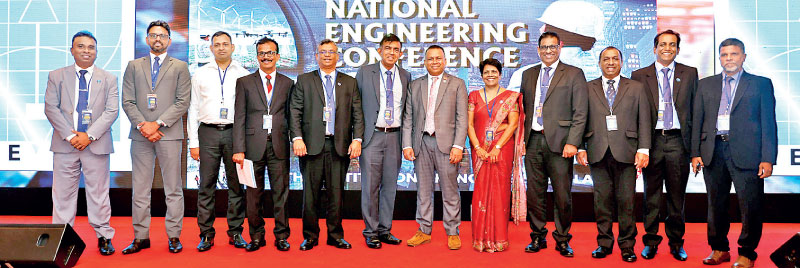Saturday Feb 21, 2026
Saturday Feb 21, 2026
Monday, 9 September 2024 00:35 - - {{hitsCtrl.values.hits}}

Speakers at the National Engineering Conference 2024
|
IESL President Eng. Prof. Ranjith Dissanayake
|
Institution of Engineers, Sri Lanka (IESL) President Eng. Prof. Ranjith Dissanayake, addressing the National Engineering Conference 2024 held recently, emphasised that engineers of the 21st century cannot sit back as engineering plays a key role in economic activities and challenges being faced today, such as in energy, infrastructure, and environment.
The National Engineering Conference is a flagship event organised by the IESL, which was held on 3 September at Cinnamon Lakeside Colombo with the participation of industry representatives, Government officials, and policymakers. It aimed to address critical national issues and provide engineering-driven solutions to challenges being faced by the country.
As the premier professional body representing engineers in Sri Lanka, the IESL consists of approximately 28,000 members, both locally and internationally. The IESL’s mission is to uphold the highest standards of engineering, promote ethical practices, and contribute to the nation’s development.
Representatives from key engineering sectors such as local manufacturing and production, agriculture, construction industry, water resources, transportation, energy, ICT, chemical petroleum, and mining presented their five-year plans from 2025 to 2029, including proposals from the IESL to adhere to for developing each sector. The outcome of the conference was published as a report – ‘Roadmap for Success 2025-2029’ – and handed over to all Presidential candidates of the Presidential election 2024 to adopt into their national policy declarations.
According to the report, Sri Lanka’s economic crisis has deepened due to the COVID-19 pandemic and the collapse of key foreign exchange revenue streams like foreign employment, the garment industry, and tourism. The sharp decline in these sectors exposed the vulnerability of an economy heavily reliant on imports and external financial flows. Further, Sri Lanka heavily depends on imports for basic needs (food, fuel, raw materials), which has led to a significant trade deficit. The pandemic exacerbated the situation by reducing foreign exchange inflows, destabilising the economy and making it vulnerable to external shocks.
Additionally, the country accumulated large foreign debts but did not invest effectively in productive sectors. Much of the debt went into unproductive infrastructure or servicing existing debt, worsening the financial situation without a matching income boost. Sri Lanka has not fully capitalised on its natural resources or developed its domestic industries. There has been insufficient focus on sectors like manufacturing, chemical processing, and energy, which has weakened the economy’s resilience.
Also, policies have favoured imports over local production and innovation, stifling entrepreneurship and limiting the development of an export-based economy. Engineers play a vital role in addressing the economic challenges by offering technical solutions and innovative strategies for sustainable development. Their input is crucial in sectors like manufacturing, infrastructure, water supply, and transportation.